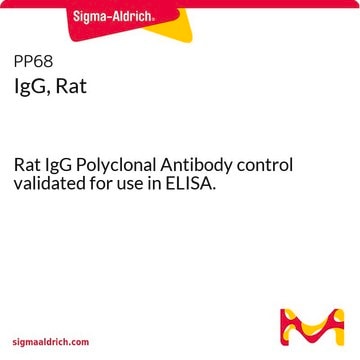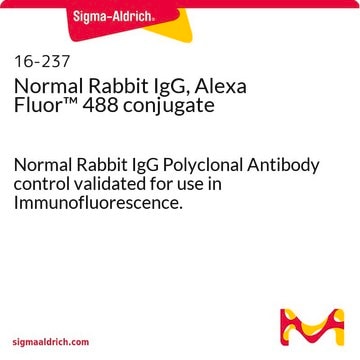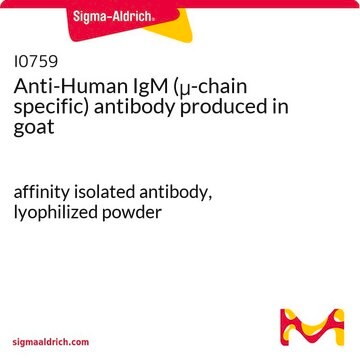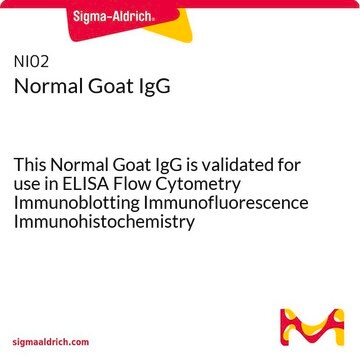12-370
Normal Rabbit IgG
Normal Rabbit IgG Polyclonal Antibody control validated for use in Immunoprecipitation & Western Blotting.
Sinónimos:
Rabbit Immunoglobulin
Iniciar sesiónpara Ver la Fijación de precios por contrato y de la organización
About This Item
UNSPSC Code:
12352203
eCl@ss:
32160702
NACRES:
NA.41
biological source
rabbit
Quality Level
conjugate
unconjugated
antibody form
purified immunoglobulin
clone
polyclonal
manufacturer/tradename
Upstate®
concentration
1 mg/mL
technique(s)
immunoprecipitation (IP): suitable
western blot: suitable
isotype
IgG
target post-translational modification
unmodified
General description
Immunoglobulin G (IgG), is one of the most abundant proteins in human serum with normal levels between 8-17 mg/mL in adult blood. IgG is important for our defense against microorganisms and the molecules are produced by B lymphocytes as a part of our adaptive immune response. The IgG molecule has two separate functions; to bind to the pathogen that elicited the response and to recruit other cells and molecules to destroy the antigen. The variability of the IgG pool is generated by somatic recombination and the number of specificities in an individual at a given time point is estimated to be 1011 variants.
Application
Research Category
Secondary & Control Antibodies
Secondary & Control Antibodies
Research Sub Category
Whole Immunoglobulin Secondary Antibodies
Whole Immunoglobulin Secondary Antibodies
Quality
Routinely evaluated by IP/WB as a non-specific IgG control.
Immunoprecipitation/Western Blot Assay:
2 µg of this lot was used as a non-specific IgG control in an immunoprecipitation / western blot assay.
Immunoprecipitation/Western Blot Assay:
2 µg of this lot was used as a non-specific IgG control in an immunoprecipitation / western blot assay.
Physical form
Purified
Purified rabbit polyclonal IgG in buffer containing 0.1 M Tris-glycine, pH 7.4, 0.15 M NaCl, with 0.05% sodium azide before the addition of glycerol to 30%. Liquid at –20°C.
Storage and Stability
Stable for 1 year at -20°C from date of receipt.
For maximum recovery of product centrifuge the original vial prior to removing the cap. Handling Recommendations: Upon first thaw, and prior to removing the cap, centrifuge the vial and gently mix the solution. Aliquot into microcentrifuge tubes and store at -20°C. Avoid repeated freeze/thaw cycles, which may damage IgG and affect product performance. Note: Variabillity in freezer temperatures below -20°C may cause glycerol containing solutions to become frozen during storage.
For maximum recovery of product centrifuge the original vial prior to removing the cap. Handling Recommendations: Upon first thaw, and prior to removing the cap, centrifuge the vial and gently mix the solution. Aliquot into microcentrifuge tubes and store at -20°C. Avoid repeated freeze/thaw cycles, which may damage IgG and affect product performance. Note: Variabillity in freezer temperatures below -20°C may cause glycerol containing solutions to become frozen during storage.
Legal Information
UPSTATE is a registered trademark of Merck KGaA, Darmstadt, Germany
Disclaimer
Unless otherwise stated in our catalog or other company documentation accompanying the product(s), our products are intended for research use only and are not to be used for any other purpose, which includes but is not limited to, unauthorized commercial uses, in vitro diagnostic uses, ex vivo or in vivo therapeutic uses or any type of consumption or application to humans or animals.
Storage Class
10 - Combustible liquids
wgk_germany
WGK 1
Certificados de análisis (COA)
Busque Certificados de análisis (COA) introduciendo el número de lote del producto. Los números de lote se encuentran en la etiqueta del producto después de las palabras «Lot» o «Batch»
¿Ya tiene este producto?
Encuentre la documentación para los productos que ha comprado recientemente en la Biblioteca de documentos.
Los clientes también vieron
Chromatin immunoprecipitation assay for tissue-specific genes using early-stage mouse embryos.
Ok Hyun Cho,Jaime A Rivera-Perez,Anthony N Imbalzano
Journal of Visualized Experiments null
Genome-wide profiling of DNA-binding proteins using barcode-based multiplex Solexa sequencing.
Sunil Kumar Raghav,Bart Deplancke
Methods in Molecular Biology null
Kinetics of facultative heterochromatin and polycomb group protein association with the herpes simplex viral genome during establishment of latent infection.
Cliffe, AR; Coen, DM; Knipe, DM
mBio null
Regulation of the PMP22 gene through an intronic enhancer.
Jones, EA; Lopez-Anido, C; Srinivasan, R; Krueger, C; Chang, LW; Nagarajan, R; Svaren, J
The Journal of Neuroscience null
Histone acetylation at the human beta-globin locus changes with developmental age.
Yin, W; Barkess, G; Fang, X; Xiang, P; Cao, H; Stamatoyannopoulos, G; Li, Q
Blood null
Nuestro equipo de científicos tiene experiencia en todas las áreas de investigación: Ciencias de la vida, Ciencia de los materiales, Síntesis química, Cromatografía, Analítica y muchas otras.
Póngase en contacto con el Servicio técnico






